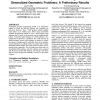Free Online Productivity Tools
i2Speak
i2Symbol
i2OCR
iTex2Img
iWeb2Print
iWeb2Shot
i2Type
iPdf2Split
iPdf2Merge
i2Bopomofo
i2Arabic
i2Style
i2Image
i2PDF
iLatex2Rtf
Sci2ools
GECCO
2005
Springer
2005
Springer
Artificial immune system for solving generalized geometric problems: a preliminary results
Generalized geometric programming (GGP) is an optimization method in which the objective function and constraints are nonconvex functions. Thus, a GGP problem includes multiple local optima in its solution space. When using conventional nonlinear programming methods to solve a GGP problem, local optimum may be found, or the procedure may be mathematically tedious. To find the global optimum of a GGP problem, a bioimmune-based approach is considered. This study presents an artificial immune system (AIS) including: an operator to control the number of antigen-specific antibodies based on an idiotypic network hypothesis; an editing operator of receptor with a Cauchy distributed random number, and a bone marrow operator used to generate diverse antibodies. The AIS method was tested with a set of published GGP problems, and their solutions were compared with the known global GGP solutions. The testing results show that the proposed approach potentially converges to the global solutions. Ca...
| Added | 29 Jun 2010 |
| Updated | 29 Jun 2010 |
| Type | Conference |
| Year | 2005 |
| Where | GECCO |
| Authors | Jui-Yu Wu, Yun-Kung Chung |
Comments (0)

